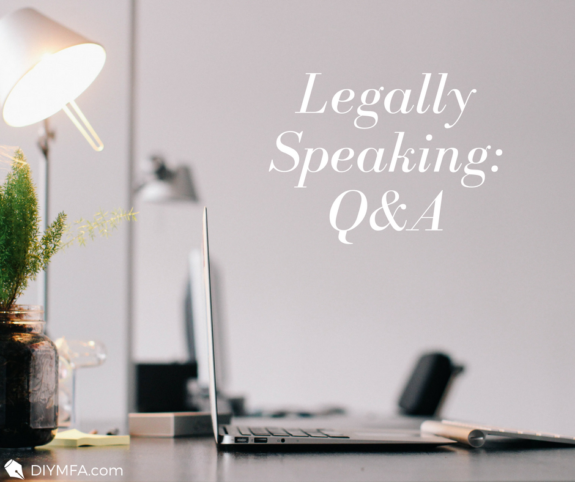You had questions… now I have answers! As we wrap up the Legally Speaking post series, I’ll address the questions that have come up during the past few weeks.
Can I use the name of a deceased person as a character name in my “based on a true story” work of fiction?
Depends on who the dead person is. If we’re talking about a historical figure who’s long-since deceased (Cleopatra, Joan of Arc, Henry VIII) chances are you don’t have an estate of that person who will sue you if you take creative liberties with that character. If on the other hand, your character is more recently deceased, you have to worry about what the legal world calls “Rights of Publicity,” which falls outside my husband’s area of expertise.
Can you write a fictional story based on factual events and people as a jumping off point?
Certainly! It’s called historical fiction. Sure, if you rewrite history defaming certain public figures you might run into trouble with their estates, but if the factual events and people are just a jumping-off point for the rest of the story, you shouldn’t have any problem. Think, for instance, of the movie Forrest Gump where the protagonist meets several presidents and John Lennon. He even “helps” Lennon write the lyrics to the song Imagine and teaches Elvis how to dance. If you’re writing a story that is embedded in a historical time period, it makes sense that people and events of that time would appear in your story.
Is there a disclaimer you need to add if you portray a factual person in a negative light within your fictional story?
The safest bet if you want to portray a factual person in a negative light (especially if you’re taking creative liberties with that person) is to change the name. If the person is really well-known, chances are readers will pick up the reference.
Can you mention brand names and actual businesses in fiction and other creative works (both as parody and not)? For instance, can you have a character shop at 7-Eleven? Can you make a joke about Lifesavers?
As far as casual mention of brand names in fiction (like having a character order a Diet Coke or listen to an iPod), my understanding is that this is OK. The main thing you should consider as a writer is whether using certain brand names will date your book. Some brands have been around for a while and are here to stay so if you mention them, it won’t immediately date your story. But other brands (particularly as far as technology goes) are constantly changing and mentioning the brand will definitely lock your story into a particular place in time. If you’re writing a book that takes place in a specific time period, then dating the story can work in your favor but if you want a more timeless feel, you’ll want to watch out for mentioning brands or types of technology that will date your story.
In terms of parody, as we mentioned in the Infringement, Fair Use and Derivative Works post you can imitate or mention existing stories or brands for humorous effect. What you need to be careful of is not to defame that brand. For instance, in the Coming to America example, the restaurant McDowell’s is a parody of the McDonald’s brand but the humor comes from the fact that the fake brand is actually almost identical to the existing brand and the owner of McDowell’s continues to insist that the brands are totally different. If, on the other hand, McDowell’s were a strip club that also happened to serve burgers and fries, that could be considered a defamation because it’s taking a family-friendly restaurant and turning it into something quite the opposite.
How does copyright work on the internet? On blogs for example? What is the “copyright” status of a blog or other internet-published piece of writing?
Generally, when you post something on a blog, it’s considered “published.” This is why it’s important to be careful about what you give away on blogs for free (i.e. posting large chunks of your novel or entire short stories). At the same time, having published something on your blog does not preclude you from publishing it elsewhere as well, as long as you make it clear to the entity publishing your work that it has already appeared on your blog.
As far as the copyright status of work on a blog, the minute you hit that publish button and your post or story or piece of writing goes live, you’ve got copyright. And what’s nice about publishing on a blog is that you have a time-stamp and date associated with when your piece was posted so if any question comes up regarding your copyright, you have that record already. Of course, if you want to sue for damages, you will do better to have actually registered the copyright to your work with the copyright office, but because of the disposable and ephemeral nature of blog posts, it is almost certainly not cost-effective.
Worst case scenario, if someone takes your content and tries to pass it off as their own, you have proof from your blog time-stamp that your content was here first. You can contact the offending party and just ask them to take the work down from their site. Public shaming is also an effective tactic.







